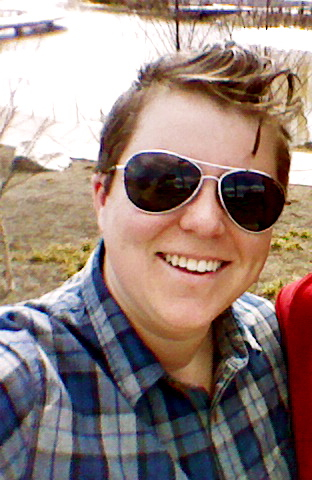Elizabeth Anderson is the program director at P&W–supported Charis Books and More and Charis Circle, a unique for-profit independent feminist bookstore and 501(c)(3) social justice literary nonprofit hybrid located in Atlanta, Georgia. She is also a writing coach and fiction writer at work on her first novel, "Paradise Park." What makes your reading series unique?
What makes your reading series unique?
Charis Books is turning thirty-eight this year. With bookstores continuously closing, we will be the oldest feminist bookstore in North America and the primary LGBT-focused bookstore in Atlanta. Our events have always reflected the old feminist axiom, "the personal is political." We believe that fiction has the power to change the world and that reading can be a revolutionary act. We maintain a deep investment in helping to center voices traditionally at the literary margins.
What recent program have you been especially proud of?
The P&W–sponsored evening with Sassafras Lowrey, editor of Kicked Out, an anthology of work by homeless LGBTQ youth. Sassafras shared her own story of homelessness and talked about receiving one teen's story via text message because the kid didn't have access to traditional modes of journalistic communication. Sassafras opted to publish it in the book with a standard English translation. That anecdote spoke to me about the value of telling our story despite the obstacles.
What’s the craziest thing that’s happened at an event you’ve hosted?
The life of a bookseller is a crazy one. We hear more confessions than priests and doctors. People share. A LOT. Folks come to a reading about how to turn a front lawn into a food producing garden and end up talking about their grandmas who, as it turns out, were from the same small town. By the end of the night, you have complete strangers hugging and smiling and trading recipes and crying over long dead people. That is the wonder of a reading at Charis.
How do you cultivate an audience?
It's about relationships. It's about remembering people's names and tastes. I call people on the phone. I invite people personally via e-mail and on Facebook. If someone buys an author's book, I remember. If that author is slated to read at our store six months later, I make sure to remind the customer. If the independent bookstore is to survive, it will be because of relationships.
How has literary presenting informed your own life?
It has made me a better writing coach: I can tell you exactly the moment at which you will begin to bore your audience (seventeen minutes, don't ever read for more than seventeen minutes straight, I don't care if you sound like James Earl Jones and are the best looking person on the planet, people will start to glaze).
What do you consider to be the value of literary programs for your community?
All writers and readers have the potential to be activists if they choose. Bookstores are gathering grounds. They are the places to come and recharge your batteries or lick your wounds or rebuild after a hard political battle. At Charis, we fight to keep the doors open for our community because we believe there is a kind of grace in the act of gathering around stories no other space in our culture can provide.
Photo: Elizabeth Anderson.
Support for Readings/Workshops events in Atlanta is provided by an endowment established with generous contributions from the Poets & Writers Board of Directors and others. Additional support comes from the Friends of Poets & Writers.
Find details about every creative writing competition—including poetry contests, short story competitions, essay contests, awards for novels, grants for translators, and more—that we’ve published in the Grants & Awards section of Poets & Writers Magazine during the past year. We carefully review the practices and policies of each contest before including it in the Writing Contests database, the most trusted resource for legitimate writing contests available anywhere.






